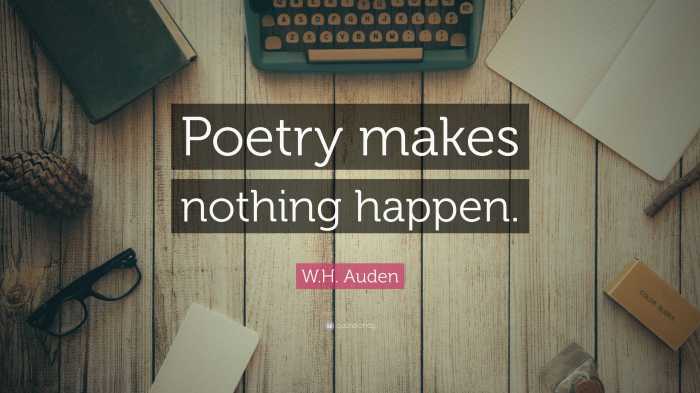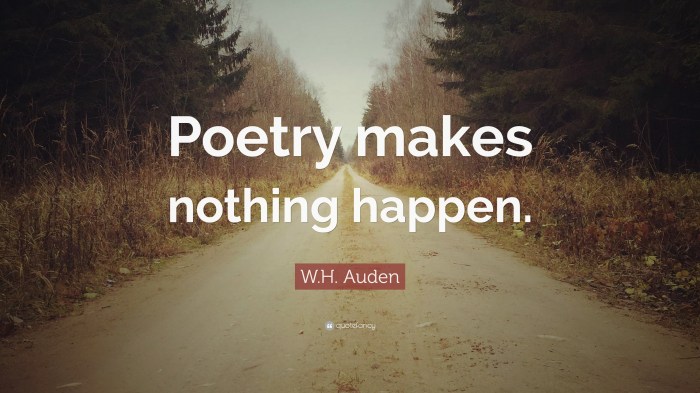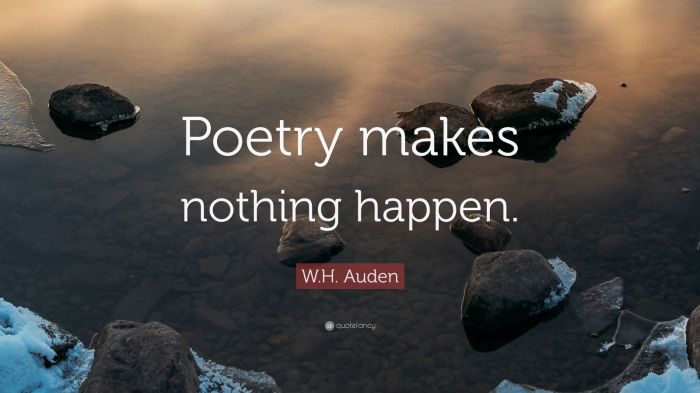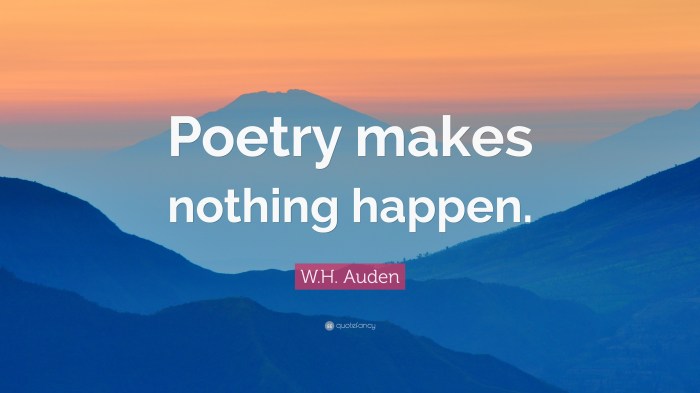Poetry makes nothing happen by julia alvarez – In her groundbreaking poem “Poetry Makes Nothing Happen,” Julia Alvarez explores the complex relationship between art and activism, questioning the power of words to incite tangible change. This analysis delves into the poem’s central theme, poetic devices, historical context, critical reception, and personal interpretations, offering a comprehensive examination of its enduring significance.
The poem’s central theme revolves around the tension between the transformative potential of poetry and its perceived limitations in bringing about concrete societal change. Alvarez grapples with the question of whether poetry can transcend its aesthetic realm to impact the material world.
Poem Overview

Julia Alvarez’s “Poetry Makes Nothing Happen” is a powerful and thought-provoking poem that explores the nature and purpose of poetry in society. The poem’s central theme is the tension between the transformative power of art and the harsh realities of the world.
Alvarez begins the poem by asserting that poetry “makes nothing happen.” She argues that poems cannot change the world or solve its problems. However, as the poem progresses, she reveals a more nuanced understanding of poetry’s role.
The poem is written in free verse, with a conversational tone that draws the reader in. Alvarez uses a variety of poetic devices, including metaphors, similes, and imagery, to create a vivid and memorable experience.
Poetic Devices, Poetry makes nothing happen by julia alvarez
Alvarez’s use of metaphors and similes in “Poetry Makes Nothing Happen” is particularly striking. In one of the poem’s most famous lines, she compares poetry to “a tiny boat / tossed on the waves of the world.” This metaphor suggests that poetry is a fragile and vulnerable thing, at the mercy of the forces of the world.
Alvarez also uses imagery to create a vivid and sensory experience for the reader. She describes the world as a place of “wars” and “famine,” and she uses images of violence and destruction to convey the harsh realities of life.
Historical and Cultural Context
“Poetry Makes Nothing Happen” was written in 1984, during a time of great political and social unrest in the United States. The poem reflects the disillusionment and despair that many people felt during this period.
Alvarez’s own experiences as a Dominican-American woman also influenced the poem. She has said that she wrote “Poetry Makes Nothing Happen” in response to the racism and sexism she experienced in her life.
Critical Reception and Legacy
“Poetry Makes Nothing Happen” has been praised by critics for its honesty, power, and beauty. The poem has been included in numerous anthologies and has been studied by scholars in a variety of fields.
The poem has also had a significant impact on other poets and writers. For example, the poet Carolyn Kizer has said that “Poetry Makes Nothing Happen” is one of the most important poems of the 20th century.
Personal Interpretation
“Poetry Makes Nothing Happen” is a poem that has resonated with me on a deep level. I agree with Alvarez that poetry cannot change the world in a concrete way. However, I believe that poetry can still have a profound impact on our lives.
Poetry can help us to see the world in a new way. It can help us to understand our own emotions and experiences. And it can help us to connect with others.
FAQ Insights: Poetry Makes Nothing Happen By Julia Alvarez
What is the main argument of “Poetry Makes Nothing Happen”?
Alvarez argues that poetry, while powerful in its ability to inspire and provoke thought, has limited capacity to directly bring about tangible social change.
How does Alvarez use poetic devices in the poem?
Alvarez employs metaphors, similes, imagery, and sound devices to create vivid and evocative language that enhances the poem’s emotional impact.
What is the historical context of the poem?
The poem was written during a period of political and social unrest in the United States, reflecting Alvarez’s experiences as a Dominican-American woman and activist.


